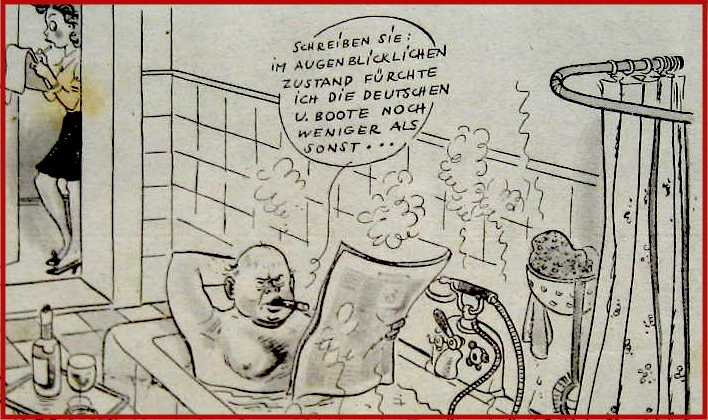
“Lousy”: Winston S. Churchill on Baths and Bathtubs
Q: “Lying in one’s own dirt”?
I have spent a fruitless few hours trying to find a quote by Churchill about bathing. I interpret his remark, “why stand when you can sit down?” as suggesting that he preferred baths to showers, but recall that when he visited Russia, he said a bath there was “like lying in one’s own dirt.” Did he say that? The reason for my interest is that I want to give up baths for a month and would like to enlist the help of someone like Sir Winston. —P.P., UK
A: No, and he probably would not approve…
I trust you are not giving up showers! Alas I can find no reference to “lying in one’s own dirt,” or similar phrases. I searched the Hillsdale College Churchill Project digital reference to 100 million words by and about Churchill. This is not dispositive: he certainly might have made that wisecrack about Russian bathtubs to a colleague whose account escaped our net. On the other hand, there are recorded instances of his bathing in places like Yalta or Moscow. Filthy or not, Russian tubs apparently didn’t stop him. After returning from the Yalta Conference, he did have his clothes fumigated—but that was a separate problem!
Leading advocate of baths
Churchill was a famous bather—twice a day when he had time. On 8 December 1900, beginning his lecture tour of North America, he addressed the New York City Press Club. “England and America are divided by a great ocean of salt water,” he declared, “but united by an eternal bathtub of soap and water.”
Baths were a lifetime habit. Even on sojourns to wild parts of Africa or the trenches of Flanders, a bathtub would be found—or packed along. Orderlies were kept busy filling baths with hot water, for Churchill preferred a precise temperature: 98 degrees. In the tub, WSC practiced “full immersion,” like a Baptist christening. He would sound like a porpoise, sending up bubbles as he exhaled. At Chartwell, this sometimes caused the bath to overflow, flooding the downstairs hallway. After a few accidents like this, a plumber installed a drain channel at the base of his tub. A famous butler, Frank Sawyers, was appalled at his bathing habits, frequently shouting, “Dear, dear, Mr. Churchill.” (That was about as censorious as Sawyers got.)
“LOUSY as a Parliamentary expression”
Neither did Churchill hesitate to apply his bathing standards to others. One victim was Hugh Gaitskell, Minister of Fuel and Power in the 1945-51 Labour Government. In 1947, with energy in short supply, Gaitskell rose to urge conservation of water. “Personally, I have never had a great many baths myself,” he told the House of Commons, “and I can assure those who are in the habit of having a great many that it does not make a great difference to their health if they have less.”
Churchill found this outrageous. Gaitskell was defying WSC’s lifetime habits and solemn beliefs. Quickly he rose from his corner seat below the Gangway on the Opposition benches:
Mr. Speaker: When Ministers of the Crown speak like this on behalf of His Majesty’s Government, the Prime Minister and his friends have no need to wonder why they are getting increasingly into bad odour. I had even asked myself, when meditating upon these points, whether you, Mr. Speaker, would admit the word LOUSY as a Parliamentary expression in referring to the Administration, provided, of course, it was not intended in a contemptuous sense but purely as one of factual narration.
Further reading
“Churchill’s Daily Routine (Or: You Can’t Get Good Help Anymore),” 2020







One thought on ““Lousy”: Winston S. Churchill on Baths and Bathtubs”
On our recent visit to Funchal, Madeira, the autonomous Portuguese island off the coast of Africa which Churchill visited briefly first in October 1899, before he became famous, on his way to South Africa for the Boer War, and again half a century later in January 1950, with his wife and daughter, for a painting holiday cut short when he had to return to Britain to prepare for a general election, my wife and I were shown the fine bathtub in the Churchill suite at Reid’s Hotel, where Churchill stayed in 1950.
Comments are closed.